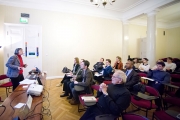Energy and State Building in Ukraine, Belarus and Lithuania: Between Domestic Oligarchs and Russian Power
On the 13th of January 2015 the Energy Policy Research Group and CEU’s Frontiers of Democracy Initiative welcomed Margarita M. Balmaceda, Professor of Diplomacy and International Relations at Seton Hall University, Research Associate at the Harvard Ukrainian Research Institute and author of, among others, Living the High Life in Minsk: Russian Energy Rents, Domestic Populism and Belarus’ Impending Crisis (Budapest: Central European University Press, 2014), for a public lecture on Energy and State Building in Post-Soviet states. A specialist on the political economy of the post-Soviet states, Professor Balmaceda has conducted extensive field research in Russia, Ukraine, Belarus, Lithuania and Moldova on the links between energy policies and political development under a Marie Curie Fellowship from the EU and fellowships from Fulbright, Alexander von Humboldt and other Foundations.
In the context of the ongoing Ukraine crisis and concerns surrounding the potential for a “weaponization” of Energy, Professor Balmaceda’s lecture provided a unique insight into the political and economic dynamics of energy dependency in a post-Soviet environment. Rejecting the dominant trend in energy dependence literature of focusing exclusively on the supply side, which she argued ignored the agency of consumer countries, she has instead spent the past years researching the political and economic dynamics in consumer countries. Choosing to do so by focusing on three post-Soviet states: Ukraine, Belarus and Lithuania, Professor Balmaceda has examined their transitions – economic, political and infrastructural – from parts of an energy-rich Soviet state to countries in energy dependency scenarios.
 One of her key findings was that the choice of energy policy, and the consequent rent-seeking opportunities, deeply affected a country’s potential for democratic state building. During the talk, she identified two periods in the post-soviet development: a period of classic rents from 1992-2012, and a post-classical period from 2012 onwards. In the classical period, the cycle of rents – i.e. their distribution, extraction and the recycling and affecting structures created by the states chosen energy policy – proved a crucial factor in an individual state’s capacity to develop democracy despite energy dependency. Professor Balmaceda explained that the opportunity for rents could take many forms, both external (energy price differentials, transit revenues, customs charges, barter arrangements) and internal (imposed mark-ups, intermediary profits, IOU/ barter arrangements and skimming potential). She added that depending on the composition of these factors, states even risked devolving into rentier states, reminiscent of those facing the traditional “resource course”.
One of her key findings was that the choice of energy policy, and the consequent rent-seeking opportunities, deeply affected a country’s potential for democratic state building. During the talk, she identified two periods in the post-soviet development: a period of classic rents from 1992-2012, and a post-classical period from 2012 onwards. In the classical period, the cycle of rents – i.e. their distribution, extraction and the recycling and affecting structures created by the states chosen energy policy – proved a crucial factor in an individual state’s capacity to develop democracy despite energy dependency. Professor Balmaceda explained that the opportunity for rents could take many forms, both external (energy price differentials, transit revenues, customs charges, barter arrangements) and internal (imposed mark-ups, intermediary profits, IOU/ barter arrangements and skimming potential). She added that depending on the composition of these factors, states even risked devolving into rentier states, reminiscent of those facing the traditional “resource course”.
Using the conceptual framework of the rent cycle affecting the power distribution within the political system, Professor Balmaceda illustrated the impact of energy policy choice on political systems by examining the causes of the vast political differences in between Ukraine, Belarus and Lithuania.
She argued that Ukrainian energy policy was focused on elitist rent-seeking and distribution, fostering a high dependence of local oligarchs on Russia and Russian energy to maintain both profit, and a high dependence of political officials on the oligarchs to maintain power. The addition of populist energy policies led to what Professor Balmaceda described as a “Trojan gas” effect, where an expectation of continuously cheap residential gas lead to a chronic weakening of key political and economic actors ability to ensure stability. She reasoned that the substantial increase in the price of Russian gas in 2012 created a watershed moment, ending the classical rent period, as this increase in prices shut down many existing arbitrage opportunities and weakening states, including Ukraine, which were dependent on rent-seeking for political and economic stability.
 In the case of Belarus, she argued that the energy policy also allowed for substantial rent-seeking behaviour, mainly from external sources. However, that, unlike in Ukraine, the political and economic recycling systems consolidated the power of the President, rather than an economic elite, while the rents themselves were shown to be generally more evenly distributed among the broader population. Professor Balmaceda argued that though this has resulted in an increase in general living standards, it severely impeded any significant transition of the economic systems since the Soviet period. She speculated that this was likely to become an increasing issue in the post-classical period, as rent-seeking and thereby populist energy policies became less feasible.
In the case of Belarus, she argued that the energy policy also allowed for substantial rent-seeking behaviour, mainly from external sources. However, that, unlike in Ukraine, the political and economic recycling systems consolidated the power of the President, rather than an economic elite, while the rents themselves were shown to be generally more evenly distributed among the broader population. Professor Balmaceda argued that though this has resulted in an increase in general living standards, it severely impeded any significant transition of the economic systems since the Soviet period. She speculated that this was likely to become an increasing issue in the post-classical period, as rent-seeking and thereby populist energy policies became less feasible.
In contrast, Professor Balmaceda explained that Lithuania energy policy in the classical period was able to facilitate democratic state building in a way that Ukraine and Belarus where unable to. She argues that this was due to a rent cycle that encouraged mainly domestic rent extraction, which, while less broadly distributed than in Belarus, nevertheless was not channelled to a single group or elite, and, importantly, developed political systems which allowed the distribution of power to a broad assembly of groups.
In conclusion, Professor Balmaceda’s talk provided a strong argument for the importance of energy policy in cases of energy dependency, and the crucial role this choice can have on a country’s capacity to successfully build a democratic state. In the context of the Ukraine crisis, her research suggests that it is the vicious cycle of oligarchical rent-seeking that has left Ukraine vulnerable to their dependence on Russian energy and energy rents for political and economic stability, in a way which countries like Lithuania are not.
Jennifer Tollmann

